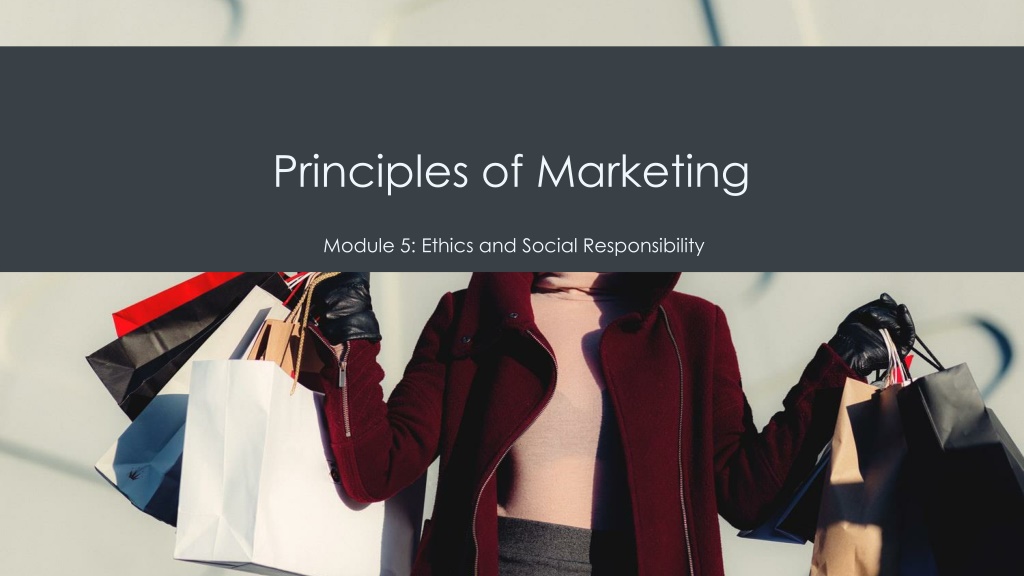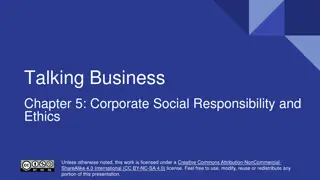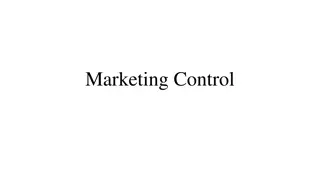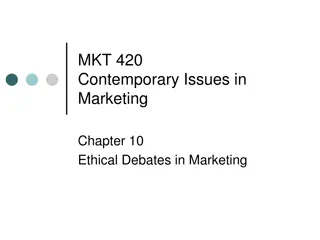Ethics and Social Responsibility in Marketing
Ethics in marketing involves adhering to moral principles to guide behavior, ensuring fair practices, honesty, and transparency. Social responsibility entails companies acting ethically towards society and stakeholders, not just shareholders. Common ethical issues in marketing include bribery, fairness, honesty, and product quality.
Download Presentation

Please find below an Image/Link to download the presentation.
The content on the website is provided AS IS for your information and personal use only. It may not be sold, licensed, or shared on other websites without obtaining consent from the author. Download presentation by click this link. If you encounter any issues during the download, it is possible that the publisher has removed the file from their server.
E N D
Presentation Transcript
Principles of Marketing Module 5: Ethics and Social Responsibility
Ethics Ethics is the set of moral principles or values that guides behavior If a company acts unethically, it risks damaging its reputation and its customers trust worse, it can face lawsuits and criminal prosecution
Norms and Values Norms are established standards of conduct that are expected and maintained by society and/or professional organizations Values represent the collective conception of what communities find desirable, important, and morally proper
Common Ethical Issues in Marketing 15% of marketing professionals say bribery is the most difficult ethical issue 14% of marketing professionals say fairness is the most difficult ethical issue 12% of marketing professionals say honesty is the most difficult ethical issue 12% of marketing professionals say price is the most difficult ethical issue 11% of marketing professionals say product is the most difficult ethical issue 10% of marketing professionals say personnel is the most difficult ethical issue 5% of marketing professionals say confidentiality is the most difficult ethical issue 4% of marketing professionals say advertising is the most difficult ethical issue 4% of marketing professionals say manipulation of data is the most difficult ethical issue
Brand Management What does the product and brand imagery of the post on the right add (if anything) to the sincerity of the gratitude compared to the simple text version?
Corporate Social Responsibility Corporate social responsibility is the ethical behavior of a company toward society It means acting responsibly toward the stakeholders not just the shareholders who have a legitimate interest in the business
Product Liability: Marketing Defects Marketing defects result from flaws in the way a product is marketed Examples include improper labeling, poor or incomplete instructions, or inadequate safety warnings
Privacy Do-Not-Call Implementation Act of 2003 The Controlling the Assault of Non-Solicited Pornography and Marketing (CAN-SPAM) Act
Keep Customer Information Secure Start with security: only collect customer data when necessary; be transparent; and treat the data with extreme care Control and restrict access to sensitive data Make sure your service providers implement reasonable security measures: write security into contracts and verify compliance Establish procedures to keep your security current and address vulnerabilities that may arise; heed credible security warnings Secure paper, physical media, and devices not all data are stored digitally
Fair Information Practice Principles. The Federal Trade Commission recommends that companies follow these guidelines: Notice: Consumers should be given notice before any personal information is collected from them. Choice: Consumers can control how their data is used. Opt in or opt out models Access: The consumer s ability to view the data collected and also to verify and contest its accuracy. Security: Information collectors should ensure that the data they collect is accurate and secure.
Fraud The Federal Trade Commission has determined that a representation, omission, or practice is deceptive if it is likely to: Mislead consumers and Affect consumers behavior or decisions about the product or service. When it comes to marketing fraud, the two key words are deliberate deception
Trust The goal of marketing is not to deceive the customer; it is, in fact, to build trust
Deception in Product Is the product designed and manufactured as the customer would expect, given the other elements of the marketing mix? Is the customer warned about the product s limitations or uses that are not recommended?
Deception in Price Is the total price of the product fairly presented to the customer? Is the price charged for the product the same as the price posted or advertised? Has something been marketed as free and, if so, does it meet FTC guidelines for the definition of free? Does the company disclose information about finance charges?
Deception in Promotion Can claims made to consumers be substantiated? Are disclaimers clear and conspicuous? For products marketed to children, is extra care taken to accurately represent the product?
Deception in Place Does the distribution channel deliver the product at the price and quality promised? Do other companies in the distribution channel (wholesalers, retailers) perform as promised and deliver on expectations set for product, price, and promotions?
Challenges of B2B Ethics Personal sales are relationship based, requiring the seller to tailor the process according to the buyer s personality and approach B2B sales are often large and complex Pricing is negotiated between the buyer and seller, rather than being set and uniform across all customers Communication about the product and pricing takes place mainly through informal or formal verbal presentations and discussions
Company Policies Company policies generally define: The total purchase authority of a single individual or department The threshold at which a purchase decision must go out for competitive bid The circumstances under which the company s status as a customer can be disclosed A dollar threshold for gifts from vendors It is wise for B2B Marketers to understand these rules to avoid putting people in awkward positions.
Business Gifts Business gifts are usually seen as an advertising, sales-promotion, and marketing-communication medium. Such gifting is usually practiced for the following reasons: 1.In appreciation for past client relationships, placing a new order, referrals to other clients, etc 2.In the hopes of creating a positive first impression that might help to establish an initial business relationship 3.As a quid pro quo returning a favor or expecting a favor in return for something
Standards for Business Conduct Define the threshold for behavior: Companies require their employees to follow the law Create expectations for behavior: The policies identify common issues that employees may encounter such as accepting gifts from suppliers and explain how they should be handled Set policy: establish company protocols for handling confidential information, including customer data, etc. Give guidance on making judgment calls Describe reporting and enforcement procedures
Judgement Calls Is it legal? If it s not legal, don t do it. Is it ethical? If it feels wrong, it probably is wrong. How would it look in the newspaper? If you wouldn t feel comfortable if your friends and family knew about your actions, you probably shouldn t do it.
Executives Shape Company Culture and Policy They set objectives, policies, and make personnel decisions.
Social Responsibility in Marketing Strategy Social responsibility may be a corporate-level strategy with specific objectives. Social responsibility may be part of the marketing mix based on the situation analysis
Sustainable Products A sustainable product is constantly environmental-friendly during its entire life From the moment the raw materials are extracted to the moment the final product is disposed of, there must be no permanent damage to the environment
Ethics for Marketing Employees Demonstrate respect for your target customer Prepare the sales team to sell effectively and ethically Demonstrate high personal standards in business relationships Provide fair value to the target customer Play nicely in the competitive environment Be truthful
Ethics Makes (Dollars and) Cents The world s most ethical companies out perform their peers in the stock market.
Practice Question You are creating a marketing plan for a pharmaceutical company. Which of these is an appropriate gift for doctors? 1. A golf vacation 2. A free continuing education seminar 3. A coffee mug
Quick Review What types of ethical and social responsibility issues does marketing need to address? What laws regulate marketing? How do ethical dilemmas in business-to-business marketing differ from those in consumer marketing? What measures do companies take to encourage ethical behavior? How can demonstrating corporate social responsibility impact marketing?




























